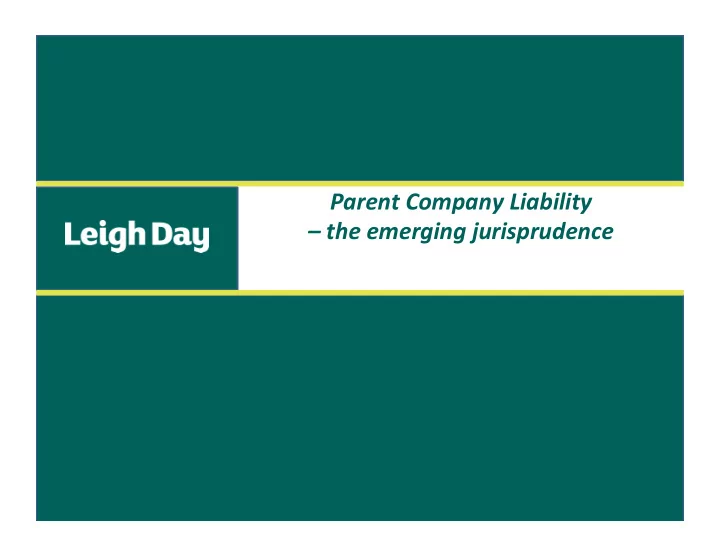

Parent Company Liability – the emerging jurisprudence
Key Parent Company Cases Connelly v RTZ Corpora/on Plc [1998] AC 854. Lubbe & Ors v Cape plc [2000] 1WLR 1545. Chandler v Cape plc [2012] 1 WLR 3111. Lungowe v Vedanta plc [2018] 3
Chandler - Guidance PotenAal liability could arise if: 1) Businesses are in a relevant respect the same. 2) Parent has superior experAse. 3) Subsidiary’s system is known to be unsafe. 4) Subsidiary relied upon parent’s superior experAse. 4
Extra-territorial Jurisdic:on? • Forum non conveniens (Spiliada Mari/me Corp v Cansulex Ltd [1987]) • ArAcle 4 of the Brussels I RegulaAon. ( Owusu v. Jackson [2005]) Mandatory jurisdicAon. • Service out CPR 6.36 – “necessary and proper party” 5
Current Parent Company Cases. Vedanta plc – Zambia Copper Mine Royal Dutch Shell plc – Oil spill clean-up Unilever plc – Kenyan Tea PlantaAons 6
Lungowe v. Vedanta Plc
Vedanta - Parent Company Liability 1. PCL is not a novel extension of the tort of negligence/a disAnct category of liability. 2. It is “blindingly obvious” that the proof will depend upon internal documents and disclosure. 3. Liability apply to parAes who have been directly impacted by subsidiaries operaAons, not just their employees. 8
Polices and Guidelines – three routes to liability Group policies could give rise to a duty in three ways: 1. DefecAve/inadequate guidance. 2. AcAve training, supervision and enforcement. 3. Parent holds itself out as exercising supervision and control but fails to do so. 9
Omission “ Similarly it seems to me that the parent may incur the relevant responsibility to third par/es if, in published materials, it hold itself out as exercising that degree of supervision and control of its subsidiaries, even if it does not in fact do so. In such circumstances its very omission may cons/tute the abdica/on of a responsibility which it has publicly undertaken ” [Para 53] 10
Court of Appeal – Okpbai v Royal Dutch Shell plc • Issuing mandatory polices/standards cannot give rise to a duty. • Must establish control / joint control of subsidiary in “ much more direct and substan/al way ”. • There would need to be evidence of enforcement of standards. • Majority Decision - Concern about floodgates. 11
Okpabi – permission to appeal • Inadequate global policies which are relied upon can give rise to a duty. • Sufficient to have superior experAse upon which subsidiary relies. No need for control. • Indeterminate liability – size is no defence. • Should not shut out case prior to disclosure. • InternaAonal standards highly relevant. 12
Court of Appeal – AAA v. Unilever • Shoehorned categories into “control and advice”. • Parent would have to acAvely enforce advice provided. • No consideraAon of whether crisis management policy framework was defecAve. • Assessment made prior to disclosure. 13
Recommend
More recommend